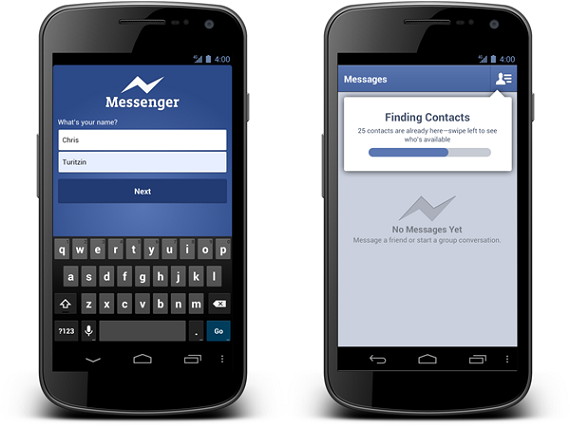
There have been rumors and speculation swirling around lately regarding Facebook’s Messenger feature the last few days. A report from TechCrunch on Sunday said that Facebook was in talks to purchase WhatsApp, an ad-free cross-platform mobile messaging app, which allows users to send each other messages without an additional fee.
Questions popped up all over: What did Facebook want with WhatsApp exactly? Was Facebook trying to launch a new messenger feature, despite having already established one last year?
Facebook would not comment on the story and WhatsApp told Vator on Monday that the story was “not factually accurate” (which part was not correct, it would not say).
On Tuesday, we got an answer. Sort of. It’s definitely not a concrete answer, but one that at least indicates where the rumors came from, and one that confirms that the story was not entirely off base. Facebook said that it will be updating its Messenger for Android app, now letting non-Facebook users to sign up for the service.
The app, which was only be available for those with a Facebook account, will now be open to anyone who wants it. And, just like that, not only did the available scope of Facebook Messenger just explode, but Facebook Messenger just became a direct rival to WhatsApp, the company it was supposedly trying to buy.
Now, as I noted yesterday, WhatsApp did not totally deny that it was involved with Facebook. And with this news coming out today, we now at least know that Facebook did have plans for its messenger service. How much involvement, if any, WhatsApp had would be interesting to find out.
Facebook first got into messaging last year. In March 2011, Facebook acquired Beluga, a free and private group messaging service for iPhone and Android devices, for an undisclosed amount. Beluga was eventually transformed into Facebook Messenger, which was launched in August 2011.
Facebook’s worldwide expansion
The move makes a ton of sense from Facebook’s point of view. Not only has it made clear its intentions to become a mobile company, but to expand to new territories where it has less of a presence. By offering Messenger to even those that don’t have an account, Facebook has to be hoping that it will lead to more people signing up for Facebook because of it. And it has chosen to first debut the feature in countries where it has the potential to grow.
A Facebooks spokesperson told VatorNews that the roll out for the new feature will begin in five countries, India, Australia, Indonesia, Venezuela and South Africa, before it reaches the rest of the world.
Why these countries?
Data from SocialBakers shows that India ranks as the number 3 country in terms of number of users, but the social network only has a 5.24% penetration rate in the country. Indonesia is also high on the list of users at number 4, but the penetration rate is once again low, at 20.92%. The large number of existing users, combined with the huge potential for growth, makes these two countries perfect candidates to roll out the new feature.
The other countries that will first see the new feature rank much lower on the number of users: Australia ranks at number 21 on the list and Venezula is number 22. South Africa is even lower down on the list, at number 32, but has a lot of growth potential, with only 12.96 of the countries population on Facebook.
This is not the first time in the last few months that Facebook has made moves to grow in new territories.
In September, Facebook teamed up with Myriad Group, which develops services for feature phones. Facebook wants to open up in new markets, and it is going to use its mobile service to do it.
Myriad was chosen by Celcom in Malaysia, Indosat in Indonesia and Mobilyin Saudia Arabia to bring social mobile messaging services to 70 million users through its text-based Myriad Updates service. By partnering with Myriad, it would bring Facebook to millions of new users in these previously untapped markets.
Facebook may be the biggest social network in the world, with one billion users, but that clearly does not mean that it is planning to stop growing any time soon.
(Image source: http://newsroom.fb.com/)




















